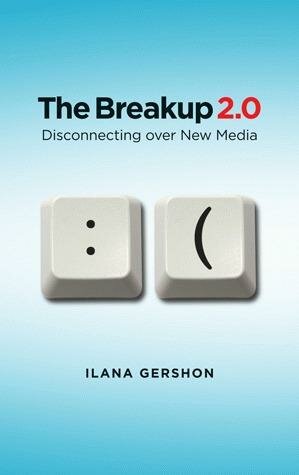
The Breakup 2.0: Disconnecting over New Media by Ilana Gershon Cornell University Press | 2010
While teaching an undergraduate class on language and culture, author Ilana Gershon asked her class to describe "bad" breakups. The answers surprised her: the students all mentioned text message and Facebook breakups. Gershon had her next research project. Over two years, conducted ethnographic interviews with 72 undergraduate students at her university.
What Gershon found is that media is now integral to most contemporary relationships. Email, text messages, instant messaging, Facebook and even face-to-face conversations were all considered mediums through which to end a relationship. The most common breakup problem interviewees reported was the appropriateness - or lack of appropriateness - of the medium used to do the breaking up. This understanding of appropriateness is linked, Gershon posits, to each person's media ideologies. Media ideologies are "a set of beliefs about communicative technologies with which users and designers explain perceived media structure and meaning" (p. 3). Understanding these ideologies is a critical way to gain insight on technology use.
Of the media Gershon discusses in her book, social networking site Facebook is prominent, in large part because of its news feed feature, which broadcasts information about one's personal life to a large network of people. As a result, "people can know about friends' love lives even though they haven't spoken to that friend in months" (p. 77). One interviewee, "Yi-Lun," disliked Facebook because it "defines my relationships" (p. 64).
Interestingly, there was no shared consensus among interviewees on how to use Facebook. Some students displayed their relationship problems on their Facebook profile by changing their "In a relationship with" status to "It's complicated" and finally, "single." Others would remove their relationship status entirely after a breakup. Still others would link their relationship status to a (platonic) friend's profile. Less commonly, some students would deactivate their Facebook account.
Indeed, Facebook can be problematic not only for disintegrating relationships, but also for new ones. "Facebook official" status "has come to stand in for exclusivity" (p. 83). Many interviewees like Yi-Lun were uncomfortable displaying their relationship statuses so they left it blank, or played jokes (like selecting "in a relationship with" a friend's dog). For those who wish to "Facebook stalk" their significant others, however, the site can be an aggravatingly detailed database of photos and public conversations.
On the other hand, sending text messages was seen as low stakes, more immediate and often "had the right level of informality for starting to flirt with someone" (p. 23). However, this informality, while appropriate for flirting, was considered by many interviewees to be too informal for a breakup. For instance, interviewee "Halle" had an ongoing text message joke with her boyfriend Doug, who always jested that he was "secretly infatuated" with Rianna, a socially graceless girl both Halle and Doug knew. When Doug texted Halle to explain that he "had to break up with her because he really was in love with Rianna,” Halle still believed this was a joke, and responded by asking "Are we still kidding?" When he insisted that he wasn't, she stopped talking with him. While conversations allow for detailed exchanges, text messages are short and casual. The reason that most interviewees believed face-to-face conversations were the ideal medium for breakups was because people "want a reason to sufficiently explain why the breakup is happening" (p. 101).
Instant messaging (IM) breakups were reportedly even more scarce, although no less unlikeable. Most interviewees were uncomfortable with breaking up on IM because "someone could simply end the conversation abruptly and without any forewarning" (p. 30). In a rare contrast, one interviewee stated that she preferred to break up by instant messaging because "if they get upset, you can just sign off, and okay, it's done ... if I am absolutely certain about the breakup, then it's instant messaging" (p. 30).
As Gershon stated repeatedly, the medium is part of the message. One could announce "I want to break up with you" in a face-to-face conversation, phone call, email, text message, instant message, or Facebook wall post, but the medium of delivery affects the message's reception. In addition, others' media ideologies will color the reception of the message.
The book is a groundbreaker, and implicitly interesting for anyone who has ever experienced a breakup, digitally or in-person. However, while Gershon's book is by no means meant to be an exhaustive coverage of all new forms of social and communicative media, there are some notable missing faces: Twitter, for instance, is quickly becoming a popular way to build networks and even relationships. In addition, people connect over other social media sites such as YouTube. Breakups are undoubtedly announced in tweets and vlogs; what of their impact? True, forms of media are such shape-shifting forces that it is challenging to document their influences, but this is clearly the next step forward from Gershon's important ethnographic study.
Another important differentiation Gershon neglected is that of the perceptible difference between those being broken up and those who initiated the breakups. When Gershon asked the students to describe difficult breakups they had experienced, it would be likely that most of them would recount breakups in which they had been the dumpees. What about those who had decided to initiate the breakups, the dumpers? Which medium did they choose, and why? Was there any consideration for the emotional impact of an email breakup versus a text message breakup? These types of questions would illuminate more than the pain and humiliation highlighted by those who were on the receiving ends of a breakup.
Regardless of these oversights, Gershon's book is an enlightening read, not only for academics studying social media and its impact on society, but for those who are interested in a smart Sunday afternoon read.

Add new comment